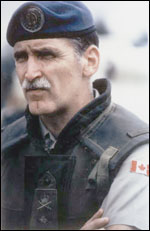|
 | Romeo Dallaire |
Romeo Dallaire Is A Haunted Man.
"Rwanda will never ever leave me. It's in the pores of my body. My soul is in those hills. My spirit is with the spirits of all those people who were slaughtered and killed... and those eyes still haunt me, angry eyes or innocent eyes, no laughing eyes. But the worst eyes that haunt me are the eyes of those people who were totally bewildered. They're looking at me with my blue beret and they're saying, 'What in the hell happened?'"
Bouts of depression and several suicide attempts have left Romeo Dallaire a different man from the snappy general who went to lead a small U.N. peacekeeping team in Rwanda in 1993. Today, he's among a select group of soldiers, politicians and diplomats who will forever be troubled by their memories of Rwanda.
Joyce Leader was a diplomat assigned to America's small, four-person embassy in Kigali, the Rwandan capital.
"I can get very, very drained by just talking about it. When I think back to Rwanda and my days there, I sometimes get very involved in all of the details and what we were trying to do and what some of the people of the country were trying to do and then why it didn't happen, and it drains me, but I think it's something that's etched in my memory and I don't think that I will ever forget."
Leader and other U.S. diplomats were helping usher a peace plan to end a four-year war between the Hutu-dominated government and Tutsi-led rebel forces. A power sharing accord had been reached eight months before, but on the evening of April 6, Rwanda's president, Juvenal Habyarimana, was killed in a mysterious plane crash. Early the next morning, Leader awoke to gunfire.
"At about 8:30, the Prime Minister called and asked if she could come and hide in my house," recalls Leader.
Leader's neighbor, Prime Minister Agathe Uwilingiyimana, was a moderate Hutu who supported sharing power with rebel Tutsi forces. As such, she was despised by extremists in the Hutu power movement. Leader told the Prime Minister she feared her own house wasn't safe. Moments later, Rwandan soldiers stormed through her front gate.
"They came looking for the Prime Minister. They were really on a rampage. They were very upset. I was probably lucky that they came so early in the day so at least they weren't drunk yet. They finally left and a half hour later we heard a scream and a shot and realized that it was the Prime Minister who had been found and killed."
The Prime Minister was one of scores of prominent people, both Tutsi and Hutu, killed in Kigali on April 7. Within the next few days, the outside world began hearing shocking reports that indicated the violence was spreading, including one from reporter Lindsey Hilsum on National Public Radio.
"I think I can say that what I saw was probably about the most horrific sight that I have ever come across. I went out into one of the suburbs and went to a house and there were the bodies of four women piled up to one side. They'd been hacked to death with machetes and flies were buzzing above."
|

